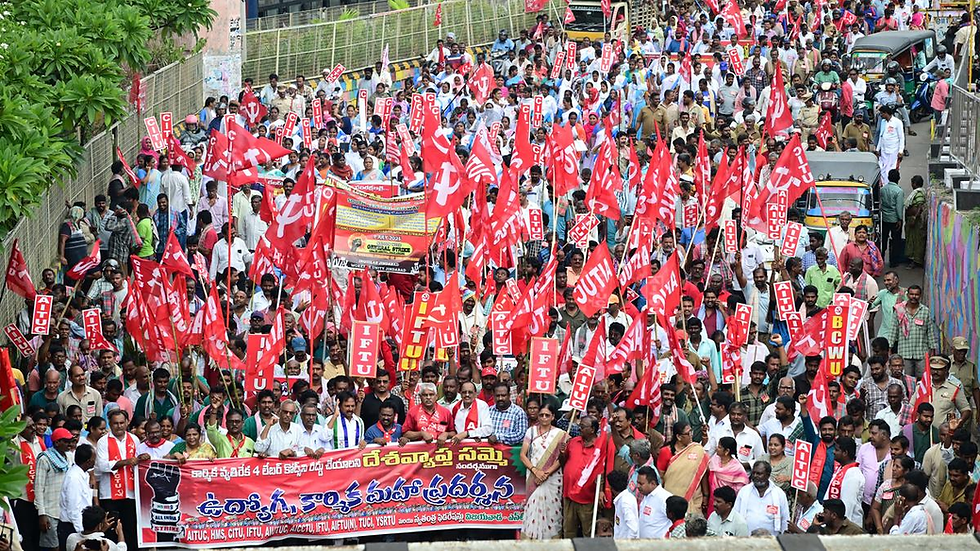Bharat Bandh Trade Unions Strike Protest Updates 2025
- Jul 10, 2025
- 4 min read
What's happening
On July 9, 2025, a coordinated nationwide strike (Bharat Bandh) was called by a coalition of 10 central trade unions (CTUs), including the Centre of Indian Trade Unions (CITU) and other Left-leaning labour platforms, to protest against what they describe as the pro-corporate, anti-worker and anti-farmer policies of the central government. While the strike’s impact varied across states, it significantly disrupted operations in key sectors and revealed deepening unrest within India’s labour and agrarian landscape.
The primary demand raised during the bandh was the repeal of the four labour codes implemented by the central government. These codes, consolidated from 29 previous labour laws, have long been criticized by unions for diluting worker protections, weakening collective bargaining rights, easing norms for retrenchment, and allowing greater flexibility to employers in hiring and firing practices. The CTUs also opposed the alleged privatization drive of key public sector undertakings (PSUs), deregulation of agriculture markets, and perceived attempts to dismantle social security institutions like the Employees’ Provident Fund Organisation (EPFO) and Employees’ State Insurance Corporation (ESIC).

Participation and Disruption Across India
According to statements issued by the trade unions, over 25 crore workers participated in the strike. Sectors such as coal, mining, electricity, ports, road transport, and railways were among the most affected. In states like Kerala, Tamil Nadu, West Bengal, Odisha, Punjab, and Assam, the strike saw widespread participation, often resulting in a bandh-like atmosphere with reduced transport, closed shops, and large rallies by workers and farmers. Rural areas in particular witnessed significant mobilisations, with informal workers, agricultural labourers, women workers, students, and youth joining in. Reports indicate that in several districts, schools and colleges declared holidays in anticipation of the strike.
The Samyukt Kisan Morcha (SKM) and associated farmer bodies also extended their support, staging parallel protests in rural blocks and sub-divisions. These groups highlighted concerns over rising input costs, lack of Minimum Support Price (MSP) guarantees, and neglect of small and marginal farmers in current policy frameworks.
Tripura: A Microcosm of Political Contestation
In Tripura, the bandh evoked a mixed response, with urban areas largely functional but rural and semi-urban regions observing limited participation. While CITU leaders and the Left Front claimed success, citing reduced public transport and visible protests in villages, the ruling BJP dismissed the bandh as a failure. BJP leader Papiya Datta argued that the bandh was politically motivated and out of touch with public sentiment. According to her, the bandh culture is an outdated relic of the Left that only hampers development.
However, CITU’s former MP Shankar Prasad Datta refuted these claims, citing deserted roads and minimal vehicle movement during peak hours as proof of public support. Former minister Manik Dey emphasized that the people’s participation reflects commitment to democratic protest, despite “threats” allegedly issued by the ruling party and TIPRA Motha.
Analysis: Rising Tensions Between State and Labour
This nationwide bandh highlights growing friction between labour unions and the central government, particularly over the restructuring of labour laws, weakening of public sector institutions, and the alleged shift towards corporate-oriented governance. While the government promotes the labour codes as progressive reforms aimed at improving ease of doing business and encouraging formalisation, unions argue that these changes undermine hard-won worker protections and reduce job security.
The bandh also signifies a convergence of interests between industrial labour and agrarian movements, a rare alignment that significantly increases the scale and moral authority of such protests. The involvement of youth and students, particularly from rural areas, reflects a generational anxiety over future employment prospects and education-linked debt under a liberalized economy.
Although no violence was reported, the bandh’s symbolic and logistical success in many regions may be viewed as a warning sign of potential larger mass mobilisations if grievances remain unaddressed. Furthermore, the political polarization around the event—especially visible in Tripura—signals that such protests are not merely economic but deeply intertwined with regional political dynamics and identity assertions.
The July 9 Bharat Bandh serves as a clear signal that a significant section of India’s working class and agrarian population remains deeply discontented with ongoing policy directions. While its immediate impact may be patchy and region-specific, the broader message of systemic dissatisfaction cannot be ignored. The bandh has reignited debates around inclusive economic growth, labour rights in a globalising economy, and the role of democratic protest in policy-making. Going forward, the government’s engagement with these stakeholders—either through confrontation or dialogue—will play a critical role in shaping India’s socio-political landscape.
#BharatBandh, Bharat Bandh today, Bharat Bandh 9 July 2025, Bharat Bandh 2025, Bharat Bandh strike, Bharat Bandh protest, Bharat Bandh news, is today Bharat Bandh, is Bharat Bandh on 9 July 2025, why Bharat Bandh on 9th July, bandh today, today bandh, today strike, strike today, today strike news, trade unions strike, trade unions protest, nationwide strike India, bank strike 9 July 2025, Bharat Bandh Bengaluru, Bharat Bandh Karnataka, Bharat Bandh 9 July 2025 Bangalore, Bharat Bandh 9 July 2025 Karnataka, Bharat Bandh West Bengal, Bharat Bandh Tripura, Bharat Bandh Delhi, Bharat Bandh Tamil Nadu, Bharat Bandh Kerala, today news, todays news, today’s news headlines, today’s sports news, Rapido during Bharat Bandh, public transport Bharat Bandh, bank strike today, what is closed during Bharat Bandh, labour code protest, government vs trade unions, Bharat Bandh effect, strike by trade unions, Bharat Bandh updates, India protest 9 July 2025, CITU strike 2025, Samyukt Kisan Morcha protest, informal workers protest, Bharat Bandh open or closed, Bharat Bandh reason




Comments